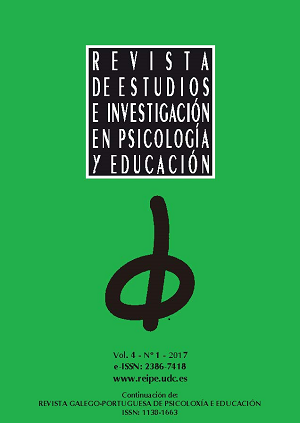College Experience Scale (EExU)
Main Article Content
Abstract
Keywords:
Downloads
Article Details
References
Bliuc, A. M., Ellis, R. A., Goodyear, P. y Muntele, H. D. (2011). Understanding student learning in context: relationships between university students’ social identity, approaches to learning, and academic performance. European Journal of Psychology of Education, 26, 417-33. https://doi.org/10.1007/s10212-011-0065-6
Buquet, C. A. G. (2013). Sesgos de género en las trayectorias académicas universitarias: orden cultural y estructura social en la división sexual del trabajo. Tesis de doctorado, de la Universidad Autónoma Metropolitana. México: El autor. https://doi.org/10.13140/RG.2.1.4657.1680
Caballero, D. C., González, G. O. y Palacio, S. J. (2015). Relación del burnout y el engagement con depresión, ansiedad y rendimiento académico en estudiantes universitarios. Salud Uninorte, 31(1), 59-69. https://doi.org/10.14482/sun.31.1.5085
Cabero, A. J., López, M. E. y Ballesteros, R. C. (2009). Experiencias universitarias innovadoras con blogs para la mejora de la praxis educativa en el contexto europeo. Revista de Universidad y Sociedad del Conocimiento; 6(2), 1-14. http://dx.doi.org/10.7238/rusc.v6i2.108
Castillo, P. C., Chacón, C. T., Díaz-Véliz, G. (2016). Ansiedad y fuentes de estrés académico en estudiantes de carreras de la salud. Investigación en Educación Médica, 5(20), 230-7. https://doi.org/10.1016/j.riem.2016.03.001
Czernik, G. E., Giménez, S., Mora, M. M. y Almirón, L. M. (2006). Variables sociodemográficas y síntomas de depresión en estudiantes universitarios de Medicina de Corrientes, Argentina. Revista Argentina de Clínica Neuropsiquiatrica, 13(2), 64-73. https://www.alcmeon.com.ar/13/50/6_czernik.htm
Feldman, L., Goncalves, L., Chacón-Puignau, G., Zaragoza, J., Bagés, N. y De Pablo, J. (2008). Relaciones entre estrés académico, apoyo social, salud mental y rendimiento académico en estudiantes universitarios venezolanos. Universitas Psychologica, 7(3), 739-751. ISSN 1657-9267 http://revistas.javeriana.edu.co/index.php/revPsycho/article/view/406
Garbanzo, V. G. M. (2007). Factores asociados al rendimiento académico en estudiantes universitarios, una reflexión desde la calidad de la educación superior pública. Revista Educación, 31(1), 43.63. http://dx.doi.org/10.15517/revedu.v31i1.1252
García-Ros, R., Pérez-González, F., Pérez-Blasco, J. y Natividad, L. A. (2012). Evaluación del estrés académico en estudiantes de nueva incorporación a la universidad. Revista Latinoamericana de Psicología, 44(2), 143-54. http://publicaciones.konradlorenz.edu.co/index.php/rlpsi/article/view/1038
González, M. G. y Zayas, P. F. (2011). Tipos de experiencias de estudiantes universitarios en su trayectoria. Mesa de discusión “Relación entre la tutoría y trayectorias escolares: Reflexiones” del III Foro Institucional de Tutorías “Experiencias y reflexiones para el seguimiento y mejora de las trayectorias escolares en la Universidad de Sonora”. http://www.dise.uson.mx/TUTORIAS/IIIFOROTUTORIAS/25.PDF
Guzmán, C. y Saucedo, C. (2005). La investigación sobre alumnos en México: recuento de una década, 1992-2002. En: Ducoing, P. (Coord.), Sujetos y procesos de formación, tomo II (pp. 641-668). México: Consejo Mexicano de Investigación Educativa. http://www.comie.org.mx/doc/portal/publicaciones/ec2002/ec2002_v08_t2.pdf
Guzmán, C. y Saucedo, C. (2007). La investigación sobre estudiantes en México (1992-2002). Un acercamiento a los estudiantes de primer ingreso a la universidad. Ponencia presentada en el Coloquio Internacional “Los estudiantes de nuevo ingreso. Un desafío para la universidad del siglo XXI”, México, 17-19 de abril.
Juárez, L. A. y Silva, G. C. (2016). La experiencia de ser universitario, un estudio cualitativo. Manuscrito presentado para su publicación.
Langa, R. D. (2006). Las experiencias académicas de los estudiantes universitarios y la clase social. Iniciación a la investigación, A18, I-X. http://revistaselectronicas.ujaen.es/index.php/ininv/article/view/299
Lee, S. (2008). Challenges and Difficulties: A Reflection on the Graduate Student Experience. Journal of Undergraduate Life Sciences. http://juls.library.utoronto.ca/index.php/juls/article/view/11162
Martínez, A. D. B. (2010). Reseña de “Cómo vivo la escuela: oficio de estudiante y micro-culturas juveniles” de Velázquez Reyes, Luz María. CPU-e Revista de Investigación Educativa, 11, 1-6. http://www.redalyc.org/pdf/2831/283121723006.pdf
Martínez, A. D. B. (2011). Reseña de “La voz de los estudiantes. Experiencias en torno a la escuela” de Carlota Guzmán Gómez y Claudia Saucedo Ramos (coordinadoras). CPU-e Revista de Investigación Educativa, 12, 1-10. http://www.redalyc.org/pdf/111/11114473011.pdf
Massachusetts Institute of Technology (2010). Holistic Graduate Student Experience. Massachusetts: MIT. http://odge.mit.edu/wp-content/uploads/2012/09/Holistic-Experience.pdf
Salanova, S. M., Martínez, M. I. M., Bresó, E. E., Llorens, G. S. y Grau, G. R. (2005). Bienestar psicológico en estudiantes universitarios: facilitadores y obstaculizadores del desempeño académico. Anales de Psicología, 21(1), 170-80. http://www.um.es/analesps/v21/v21_1/16-21_1.pdf
Silva, L. M. (2011). El primer año universitario. Un tramo crítico para el éxito académico. Perfiles Educativos, XXXIII, 102-14. http://www.scielo.org.mx/scielo.php?script=sci_arttext&pid=S0185-26982011000500010
Vanderbilt University (2002). The Graduate Student Experience: An Interview with Ann E. Austin. CFT’s Newsletter, Teaching Forum. https://cft.vanderbilt.edu/library/articles-and-essays/the-teaching-forum/the-graduate-student-experience-an-interview-with-ann-e-austin/
Velázquez, R. L. M. (2007). Cómo vivo la escuela: oficio de estudiante y micro-culturas juveniles. México: SEIEM/Gobierno del Estado de México.
Vries, W., León, A. P., Romero, M. J. F. y Hernández, S. I. (2011). ¿Desertores o decepcionados? Distintas causas para abandonar los estudios universitarios. Revista de la Educación Superior, XL(160), 29-49. http://www.scielo.org.mx/scielo.php?script=sci_arttext&pid=S0185-27602011000400002


